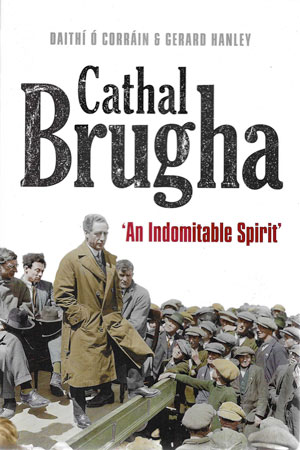CATHAL BRUGHA: ‘AN INDOMITABLE SPIRIT’
Published in Book Reviews, Book Reviews, Issue 6 (November/December 2022), Reviews, Volume 30DAITHÍ Ó CORRÁIN and GERARD HANLEY
Four Courts Press
€22.45
ISBN 9781801510172
Reviewed by Gerard Shannon
Gerard Shannon’s Liam Lynch: Irish revolutionary is due for release from Merrion Press in March 2023.
While much has been done recently to illuminate the lives of unknown activists (especially women) of the early twentieth-century Irish revolutionary period, the abundance of archival material also presents opportunities for refreshing, nuanced analysis of the well-known figures. It is in this spirit that Dáithí Ó Corráin and Gerard Hanley have collaborated to produce an impressive new biography, Cathal Brugha: ‘an indomitable spirit’.
Remarkably, their work is only the second full-length English-language biography of Brugha, following Fergus O’Farrell’s in 2018. Much like O’Farrell, both authors lay out the first problem confronting historians on researching Brugha: the sheer absence of primary source material. Perhaps suggesting a sort of over-effectiveness as a revolutionary and conspirator, Brugha destroyed much of his ministerial and personal correspondence, thereby creating enormous difficulties in getting a full sense of his character and decision-making. (This goes some way towards explaining the lack of biographies of Brugha thus far.) Nonetheless, both authors, even more so than O’Farrell’s brief work, cast a wide net across sometimes obscure secondary sources and accounts, along with the limited available primary material, to get a sense of the man behind the martyred icon and devotee of Irish republicanism.
Brugha’s life is often summarised in commemoration by being book-ended by two major episodes of his revolutionary career: his activities as a Volunteer during Easter Week 1916, which left him with considerable injuries, and his death in the early days of the Civil War. Yet the authors are keen to illuminate Brugha beyond the image of the devoted ‘soldier of the Republic’ in popular memory. There is an intriguing look into Brugha’s family background and how witnessing his father’s considerable financial losses in his youth may have contributed to his later harsh criticisms of the IRA leadership’s financial accounting during the War of Independence. Also explored is the influence of the Irish-language movement and his Gaelic League membership, such as his presidency of the militant Keating branch.
There is also a forensic exploration of the true nature of the feud between Collins and Brugha, often defined (almost to the point of parody) by Brugha’s dismissal of Collins as ‘the man who won the war’ during the Treaty debates. Both authors convincingly argue, with several examples, that there was a relatively strong working relationship between Collins and Brugha until 1920, despite their vastly different personalities. (Collins, of course, was the more outgoing, while Brugha was more pious and with few friends in the wider revolutionary movement.) As the book details, their falling out is rarely presented and explained from Brugha’s point of view, especially in the light of his being the minister for defence in the Dáil cabinet, to whom the IRA was supposedly answerable. Looming over it all was Brugha’s distrust of the Irish Republican Brotherhood, in which Collins wielded considerable influence. The authors also explore a turbulent working relationship between Brugha and IRA chief-of-staff Richard Mulcahy, which utterly soured from early 1921 onwards over Brugha’s criticism of IRA financial accounting. This dispute culminated in Brugha’s doomed scheme to reorganise the IRA, which is explained well. What is clear is that, despite a strong, pugnacious personality, at the heart of Brugha’s clashes with these men was his wish for the IRA to be under civilian control and answerable to Dáil Éireann, rather than under the shadowy auspices of the IRB.
Beyond his political activism, the book also explores Brugha’s belief in the use of political violence for the republican cause—the expected fervent devotion on joining the Irish Volunteers, his celebrated heroism during Easter Week, and the rebuilding of the organisation despite the wounds he suffered during the insurrection. One of the most fascinating episodes was his plan to assassinate members of the British cabinet in London in 1918, which Brugha occasionally attempted to revive. His doomed, fateful confrontation with Free State forces during the Civil War is well revisited here, and there are insights into Brugha’s own position in the lead-up to the outbreak of that conflict: he wielded little influence on the anti-Treaty IRA; he gave cautious support to de Valera’s Document No. 2; and there was a rarely referenced apology to Collins during a Dáil sitting in February 1922 for an earlier attack on Collins during the Treaty debates. One of the great strengths of the book is exploring the life of his wife Caitlín Brugha, a self-made businesswoman who remained a fervent republican and devoted to her husband’s memory.
Given the lack of material, one contention with readers may be the engagement with certain sources. This reviewer was surprised, given the huge array of sources used, that there was little use of Ernie O’Malley’s 1950s interviews with IRA veterans, which do sometimes mention Brugha. Some may take issue with the fact that intriguing aspects of the book’s subject remain an enigma, only briefly inferred in the absence of more archival material (such as Brugha’s alleged sympathies with the labour movement or dismissal of the Dáil Courts’ effectiveness). In this respect, the authors would have been forgiven for taking more risks in exploring certain byways by further speculating on some of these unknowns of Brugha’s life and political thinking. Yet these are minor criticisms; the book is an engrossing, detailed exploration of an important life rarely presented beyond the familiar beats in other works on the period.

















